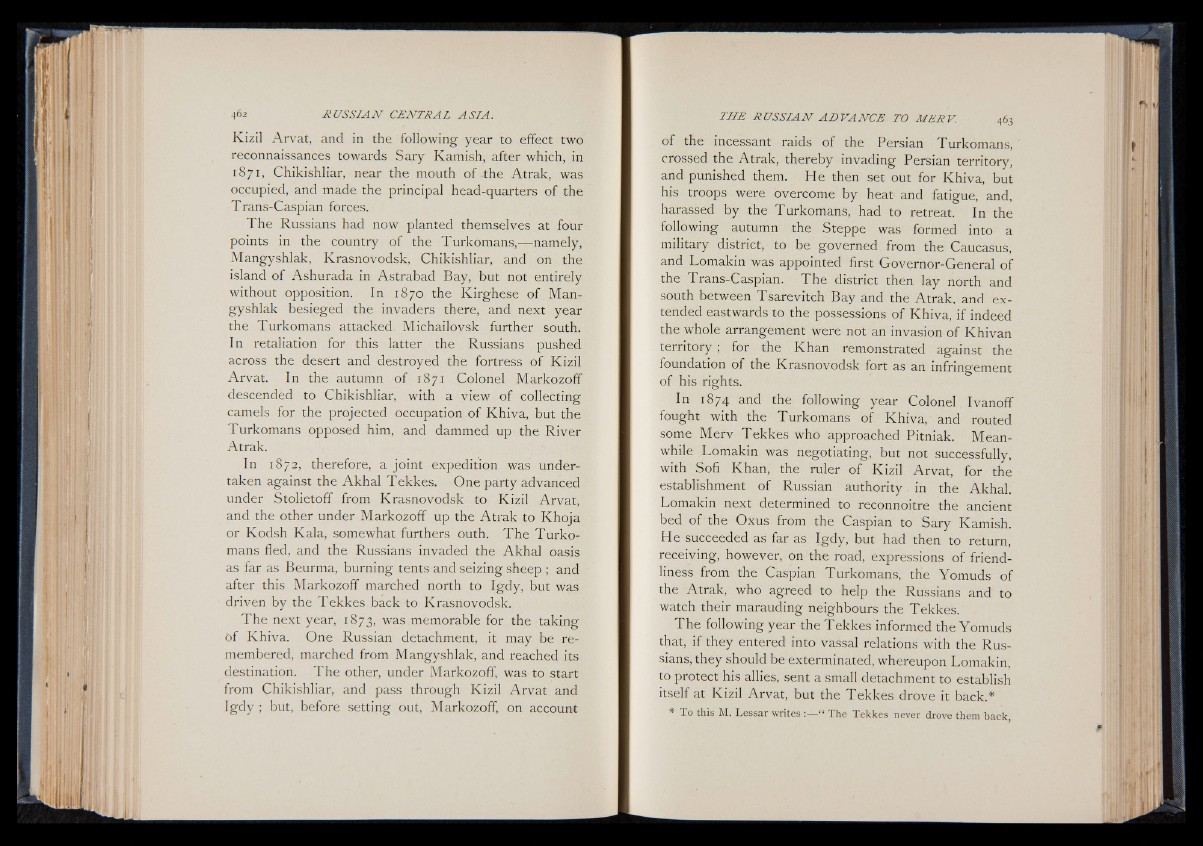
Kizil Arvat, and in the following year to effect two
reconnaissances towards Sary Kamish, after which, in
1871, Chikishliar, near the mouth of the Atrak, was
occupied, and made the principal head-quarters of the
Trans-Caspian forces.
The Russians had now planted themselves at four
points in the country of the Turkomans,-^namely,
Mangyshlak, Krasnovodsk, Chikishliar, and on the
island of Ashurada in Astrabad Bay, but not entirely
without opposition. In 1870 the Kirghese of Mangyshlak
besieged the invaders there, and next year
the Turkomans attacked Michailovsk further south.
In retaliation for this latter the Russians pushed
across the desert and destroyed the fortress of Kizil
Arvat. In the autumn of 1871 Colonel Markozoff
descended to Chikishliar, with a view of collecting
camels for the projected occupation of Khiva, but the
Turkomans opposed him, and dammed up the River
Atrak.
In 1872, therefore, a joint expedition was undertaken
against the Akhal Tekkes. One party advanced
under Stolietoff from Krasnovodsk to Kizil Arvat,
and the other under Markozoff up the Atrak to Khoja
or Kodsh Kala, somewhat furthers outh. The Turkomans
fled, and the Russians invaded the Akhal oasis
as far as Beurma, burning tents and seizing sheep ; and
after this Markozoff marched north to Igdy, but was
driven by the Tekkes back to Krasnovodsk.
The next year, 1873, was memorable for the taking
of Khiva. One Russian detachment, it may be remembered,
marched from Mangyshlak, and reached its
destination. The other, under Markozoff, was to start
from Chikishliar, and pass through Kizil Arvat and
Igdy ; but, before setting out, Markozoff, on account
of the incessant raids of the Persian Turkomans,
crossed the Atrak, thereby invading Persian territory,
and punished them. He then set out for Khiva, but
his troops were overcome by heat and fatigue, and,
harassed by the Turkomans, had to retreat. In the
following autumn the Steppe was formed into a
military district, to be governed from the Caucasus,
and Lomakin was appointed first Governor-General of
the Trans-Caspian. The district then lay north and
south between Tsarevitch Bay and the Atrak, and extended
eastwards to the possessions of Khiva, if indeed
the whole arrangement were not an invasion of Khivan
territory ; for the Khan remonstrated against the
foundation of the Krasnovodsk fort as an infringement
of his rights.
In 1874 and the following year Colonel Ivanoff
fought with the Turkomans of Khiva, and routed
some Merv Tekkes who approached Pitniak. Meanwhile
Lomakin was negotiating, but not successfully,
with Sofi Khan, the ruler of Kizil Arvat, for the
establishment of Russian authority. in the Akhal.
Lomakin next determined to reconnoitre the ancient
bed of the Oxus from the Caspian to Sary Kamish.
He succeeded as far as Igdy, but had then to return,
receiving, however, on the road, expressions of friendliness
from the Caspian Turkomans, the Yomuds of
the Atrak, who agreed to help the Russians and to
watch their marauding neighbours the Tekkes.
T h e following year the Tekkes informed the Yomuds
that, if they entered into vassal relations with the Russians,
they should be exterminated, whereupon Lomakin,
to protect his allies, sent a small detachment to establish
itself at Kizil Arvat, but the Tek kes drove it back.*
* To this M. Lessar writes “ The Tekkes never drove them back,